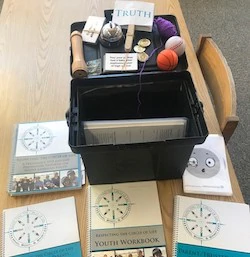Published 2018
Respecting the Circle of Life: Mind, Body and Spirit

"One mother said she enjoyed the role-playing, and felt confident that when the situation arises, she will know what to do."
- RCL program facilitator
Program Description
Respecting the Circle of Life: Mind, Body and Spirt (RCL) is a program tailored for Native American teens and their parents or other trusted adults which aims to reduce teens’ engagement in risky sexual behaviors. RCL is delivered during a summer day camp, a key design choice to engage and retain youth, particularly those who may be disengaged from school. Johns Hopkins University developed RCL and is evaluating the program to determine its effectiveness and contribute knowledge to the teen pregnancy prevention evidence base, which currently does not include any programs developed and evaluated for Native American communities.
- Population: Native American adolescents, ages 11-19 years, and their parents or other trusted adults
- Locations: One rural, reservation-based Native American community in Arizona
- Partners: Indian Health Service, local community advisory board, members of the local youth council, key tribal leaders, Elders from the community, basketball coaches and other community volunteers
Goals
- Reduce rates of teen pregnancy and sexually transmitted infections (STIs)
- Reduce the risks of sexual activity
- Improve communication about these topics between parents and children and improve parental monitoring
Strategies
Summer camp-based lessons
Delivered as part of a basketball-themed summer camp and chosen for its appeal to the community, the first eight lessons of RCL are delivered in all-male or all-female peer groups made up of 8 to 12 youth. A pair of trained, paraprofessional Native American community health workers lead the daily lessons which include a mix of teambuilding activities, role plays, games, and classroom-style instruction. Lessons focus on developing skills to support communication, problem solving, decision making, values clarification, and planning for the future.
Family-based lesson
During RCL’s final lesson, a community health worker meets with the youth and his or her parent or another trusted adult, at home or in another private location. The parent lesson begins with a video filmed in the participating community—featuring Elders and other community members, some of whom are speaking in their own language—that describes the problem of teen pregnancy and strategies for prevention. The video is followed by workbook activities, including role-playing exercises, that help parents communicate with their children about sexual and reproductive health, develop monitoring strategies, and gain confidence talking with their children about sex. Cultural relevance is an important feature of RCL. Members of the community advisory board have been involved in every aspect of curriculum development to make sure RCL content, activities, language, and examples are culturally appropriate and relevant to Native American communities.
“It is easier to talk about sex and pregnancy with my son since he went to camp.”
- RCL parent participant
Stats at a Glance
- 35.1 American Indian/Alaska Native teen birth rate (per 1,000 females ages 15-19) in 20161
- 20.3 national teen birth rate (per 1,000 females ages 15-19) in 20161
- 94% youth responded to a follow-up survey one year after the program ended
- 87% parents responded to a follow-up survey one year after the program ended
- 200 youth-parent pairs enrolled in RCL’s first two cohorts in 2016 and 2017
Grantee Information
Lauren Tingey
Associate Director, Johns Hopkins Center for American Indian Health
410-955-6931
ltingey1@jhu.edu
http://caih.jhu.edu/
Print the full success story here.
About the TPP Program
The Office of Population Affairs (OPA) Teen Pregnancy Prevention (TPP) program is a federal grant program that funds diverse organizations working to prevent teen pregnancy across the United States. OPA invests in both the implementation of evidence-based programs and the development and evaluation of new and innovative approaches to prevent teen pregnancy. The OPA TPP program reaches adolescents ages 10-19, with a focus on populations with the greatest need in order to reduce disparities in teen pregnancy and birth rates.
Footnotes
1 Martin, J.A., Hamilton, B.E., Osterman, M.J., Driscoll, A.K., & Drake, P. (2018). Births: Final data for 2016. National Vital Statistics Report, 67(1). Hyattsville, MD: National Center for Health Statistics. www.cdc.gov/nchs/data/nvsr/nvsr67/nvsr67_01.pdf. back to top
 An official website of the United States government
An official website of the United States government
